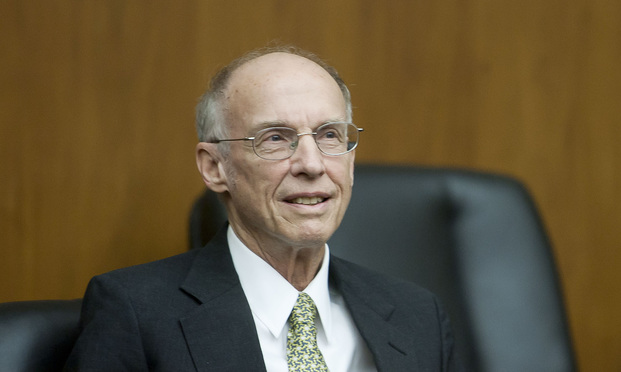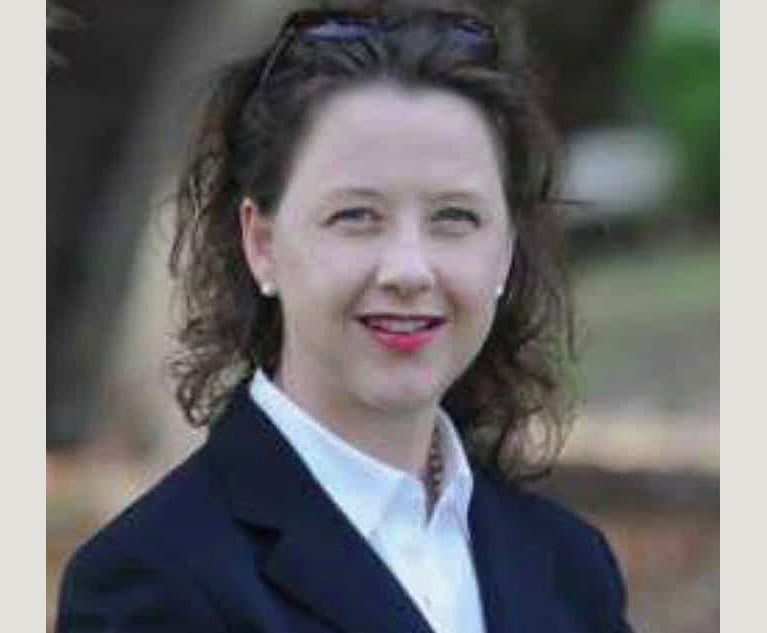Judges Skeptical of Defining 'Public Charge' in Trump Immigration Policy Fight
One judge seemed wary of creating a permanent definition for an immigration policy, comparing it to an accordion that should be "somewhat flexible simply because the needs of the country change."
May 08, 2020 at 12:57 PM
4 minute read
 J. Harvie Wilkinson III. Photo: Diego M. Radzinschi/ALM
J. Harvie Wilkinson III. Photo: Diego M. Radzinschi/ALM
Judges on the U.S. Court of Appeals for the Fourth Circuit on Friday questioned the changing interpretation of a "public charge" under a Trump administration immigration policy and whether they had the authority to permanently define it.
A lawsuit brought by Georgetown Law's Institute for Constitutional Advocacy and Protection, on behalf of the group Casa de Maryland and several immigrants, challenged the administration's rule issued last year that makes it more difficult for noncitizen immigrants who receive public benefits to become permanent legal citizens. The challengers argue that impacted immigrants are withdrawing from benefits they need, such as food stamps, in order to meet the requirements.
On Friday, Justice Department lawyer Gerry Sinzdak urged the judges to reverse a preliminary injunction placed against the policy by U.S. District Judge Paul Grimm of Maryland. The Fourth Circuit previously stayed that ruling while the case went up on appeal.
Judge J. Harvie Wilkinson took the lead in pressing attorneys from both parties about the definition of "public charge," which the administration changed to mean an immigrant who receives benefits for more than 12 months during a three-year period.
Wilkinson asked, if a new administration were to come into power in January 2021, whether those officials would also be allowed to change the definition of public charge. Sinzdak said they would.
He later posed similar questions to ICAP attorney Jonathan Backer, who said the definition could be changed again, but had to fit certain requirements.
"This might be a case in which you both are putting forward a permissible definition of public charge," Wilkinson said. "It's not an either/or situation, it's a situation where you're lined up in this as adversaries before us today and yet your views might both be right."
However, the judges seemed wary of wading too far into setting immigration policy. Wilkinson said he didn't want to be in a position where the courts are setting terms for policies that are left to the executive and legislative branches.
"I kind of look at it all as an accordion, which goes in and out. The policy should be like that accordion—sometimes permissive, sometimes restrictive, depending upon the needs of the country, the circumstances on the ground, the results of different elections," Wilkinson said of immigration policy. "But if we try to freeze the definition of this and try to simply fix it and set it in some sort of concrete where Congress has not done so, don't we just pardon and rigidify a policy which has to be somewhat flexible simply because the needs of the country change?"
Judge Paul Niemeyer later pressed U.S. House lawyer Adam Grogg, who argued as an amicus in the case, about why lawmakers didn't change the law to more firmly define the term in their favor rather than make the argument in court.
"It's curious to me that the House of Representatives would come to an Article III court and ask the court to construe a statute in the way the House intended, when the House can simply say what is intended," Niemeyer said. "And I find the whole thing a little out of balance to our functions."
Wilkinson and Niemeyer were both appointed to the bench by Republican presidents. Judge Robert King, who also heard Friday's arguments, was tapped by Democrat Bill Clinton.
The public charge litigation has played out in several appellate courts. A group of Democratic states, with New York Attorney General Letitia James pushing its cause, recently asked the U.S. Supreme Court to block the rule during the COVID-19 pandemic. The justices denied the request, but said the petition could be refiled with a lower court.
This content has been archived. It is available through our partners, LexisNexis® and Bloomberg Law.
To view this content, please continue to their sites.
Not a Lexis Subscriber?
Subscribe Now
Not a Bloomberg Law Subscriber?
Subscribe Now
NOT FOR REPRINT
© 2025 ALM Global, LLC, All Rights Reserved. Request academic re-use from www.copyright.com. All other uses, submit a request to [email protected]. For more information visit Asset & Logo Licensing.
You Might Like
View All
Hogan Lovells, Jenner & Block Challenge Trump EOs Impacting Gender-Affirming Care
3 minute read
GOP-Led SEC Tightens Control Over Enforcement Investigations, Lawyers Say

SEC Sued for Failing to Reveal Records Involving Simpson Thacher Attorney
4 minute read
Ex-Prosecutor’s Trial Ends as Judge Throws Out Her Felony Indictment in Ahmaud Arbery Death Case
Trending Stories
- 1January Petitions Press High Court on Guns, Birth Certificate Sex Classifications
- 2'A Waste of Your Time': Practice Tips From Judges in the Oakland Federal Courthouse
- 3Judge Extends Tom Girardi's Time in Prison Medical Facility to Feb. 20
- 4Supreme Court Denies Trump's Request to Pause Pending Environmental Cases
- 5‘Blitzkrieg of Lawlessness’: Environmental Lawyers Decry EPA Spending Freeze
Who Got The Work
J. Brugh Lower of Gibbons has entered an appearance for industrial equipment supplier Devco Corporation in a pending trademark infringement lawsuit. The suit, accusing the defendant of selling knock-off Graco products, was filed Dec. 18 in New Jersey District Court by Rivkin Radler on behalf of Graco Inc. and Graco Minnesota. The case, assigned to U.S. District Judge Zahid N. Quraishi, is 3:24-cv-11294, Graco Inc. et al v. Devco Corporation.
Who Got The Work
Rebecca Maller-Stein and Kent A. Yalowitz of Arnold & Porter Kaye Scholer have entered their appearances for Hanaco Venture Capital and its executives, Lior Prosor and David Frankel, in a pending securities lawsuit. The action, filed on Dec. 24 in New York Southern District Court by Zell, Aron & Co. on behalf of Goldeneye Advisors, accuses the defendants of negligently and fraudulently managing the plaintiff's $1 million investment. The case, assigned to U.S. District Judge Vernon S. Broderick, is 1:24-cv-09918, Goldeneye Advisors, LLC v. Hanaco Venture Capital, Ltd. et al.
Who Got The Work
Attorneys from A&O Shearman has stepped in as defense counsel for Toronto-Dominion Bank and other defendants in a pending securities class action. The suit, filed Dec. 11 in New York Southern District Court by Bleichmar Fonti & Auld, accuses the defendants of concealing the bank's 'pervasive' deficiencies in regards to its compliance with the Bank Secrecy Act and the quality of its anti-money laundering controls. The case, assigned to U.S. District Judge Arun Subramanian, is 1:24-cv-09445, Gonzalez v. The Toronto-Dominion Bank et al.
Who Got The Work
Crown Castle International, a Pennsylvania company providing shared communications infrastructure, has turned to Luke D. Wolf of Gordon Rees Scully Mansukhani to fend off a pending breach-of-contract lawsuit. The court action, filed Nov. 25 in Michigan Eastern District Court by Hooper Hathaway PC on behalf of The Town Residences LLC, accuses Crown Castle of failing to transfer approximately $30,000 in utility payments from T-Mobile in breach of a roof-top lease and assignment agreement. The case, assigned to U.S. District Judge Susan K. Declercq, is 2:24-cv-13131, The Town Residences LLC v. T-Mobile US, Inc. et al.
Who Got The Work
Wilfred P. Coronato and Daniel M. Schwartz of McCarter & English have stepped in as defense counsel to Electrolux Home Products Inc. in a pending product liability lawsuit. The court action, filed Nov. 26 in New York Eastern District Court by Poulos Lopiccolo PC and Nagel Rice LLP on behalf of David Stern, alleges that the defendant's refrigerators’ drawers and shelving repeatedly break and fall apart within months after purchase. The case, assigned to U.S. District Judge Joan M. Azrack, is 2:24-cv-08204, Stern v. Electrolux Home Products, Inc.
Featured Firms
Law Offices of Gary Martin Hays & Associates, P.C.
(470) 294-1674
Law Offices of Mark E. Salomone
(857) 444-6468
Smith & Hassler
(713) 739-1250








